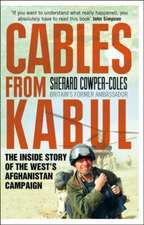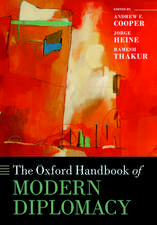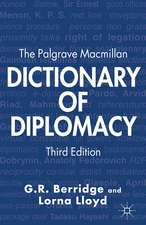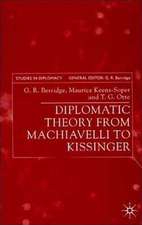After the Rubicon: Congress, Presidents, and the Politics of Waging War: Chicago Series on International and Domestic Institutions
Autor Douglas L. Krineren Limba Engleză Paperback – dec 2010
After the Rubicon challenges this conventional wisdom by illuminating the diverse ways in which legislators influence the conduct of military affairs. Douglas L. Kriner reveals that even in politically sensitive wartime environments, individual members of Congress frequently propose legislation, hold investigative hearings, and engage in national policy debates in the public sphere. These actions influence the president’s strategic decisions as he weighs the political costs of pursuing his preferred military course.
Marshalling a wealth of quantitative and historical evidence, Kriner expertly demonstrates the full extent to which Congress materially shapes the initiation, scope, and duration of major military actions and sheds new light on the timely issue of interbranch relations.
Preț: 320.80 lei
Nou
Puncte Express: 481
Preț estimativ în valută:
61.39€ • 64.01$ • 51.02£
61.39€ • 64.01$ • 51.02£
Carte tipărită la comandă
Livrare economică 21 martie-04 aprilie
Preluare comenzi: 021 569.72.76
Specificații
ISBN-13: 9780226453569
ISBN-10: 0226453561
Pagini: 336
Ilustrații: 2 halftones, 20 line drawings, 16 tables
Dimensiuni: 152 x 229 x 20 mm
Greutate: 0.48 kg
Editura: University of Chicago Press
Colecția University of Chicago Press
Seria Chicago Series on International and Domestic Institutions
ISBN-10: 0226453561
Pagini: 336
Ilustrații: 2 halftones, 20 line drawings, 16 tables
Dimensiuni: 152 x 229 x 20 mm
Greutate: 0.48 kg
Editura: University of Chicago Press
Colecția University of Chicago Press
Seria Chicago Series on International and Domestic Institutions
Notă biografică
Douglas L. Kriner is assistant professor of political science at Boston University and coauthor of The Casualty Gap: The Causes and Consequences of American Wartime Inequalities.
Cuprins
List of Figures
List of Tables
Acknowledgments
List of Tables
Acknowledgments
Chapter 1 Introduction: Domestic Politics and Waging War
Chapter 2 Mechanisms of Congressional Influence
Chapter 3 Partisan Politics and the Initiation, Scale, and Duration of War
Chapter 4 Congressional Actions and the Conduct of War
Chapter 5 “Sitting Ducks”: Marines in Beirut, 1982–84
Chapter 6 The Logic of Congressional Action
Chapter 7 Conclusion: Congressional Constraints and the War on Terror
Chapter 2 Mechanisms of Congressional Influence
Chapter 3 Partisan Politics and the Initiation, Scale, and Duration of War
Chapter 4 Congressional Actions and the Conduct of War
Chapter 5 “Sitting Ducks”: Marines in Beirut, 1982–84
Chapter 6 The Logic of Congressional Action
Chapter 7 Conclusion: Congressional Constraints and the War on Terror
References
Index
Recenzii
“Many [have] concluded that Congress has little to no influence over how presidents use military force. This book is a powerful corrective to that long-held view. Kriner marshals considerable quantitative and qualitative evidence—the use of archival data from the Reagan Library is particularly welcome—to illustrate how congressional actions influence the use of military force, the scope of military actions, and the duration of military actions in the post-WW II period. Building on a well-developed theoretical model, he demonstrates that legislation, congressional hearings, and the resulting national debates shape how presidents prosecute wars. An important contribution to the scholarly literature.”
“This is a terrific book: rigorous, important, and one of the very best contributions on political accountability.”
“Douglas Kriner closely scrutinizes how and when Congress influences foreign policy in this very fine book. This is the best statement, quantitative or qualitative, I've seen on the role of Congress in American foreign policy making.”
“Studies of war and research on Congress typically stand in isolation from each other. Kriner’s new book demonstrates big payoffs from examining the two in concert. He shows how the balance of party power in the legislature trumps conventional strategic variables in explaining the duration of U.S. military conflicts. Kriner also reveals how informal legislative actions, such as hearings, investigations, and resolutions, limit the president’s use of force. The book draws on a wide range of statistical and qualitative evidence and should cause even diehard realists to look more seriously at domestic constraints on U.S. actions abroad. In sum, Kriner’s work suggests that reports of Congress’s death as a participant in international relations are greatly exaggerated.”
“In this important book, Douglas Kriner challenges those who argue that the president dominates U.S. military policy and can ignore Congress with impunity. In his careful theoretical and empirical analysis, Kriner demonstrates that, contrary to conventional wisdom, Congress in fact often exerts considerable influence over presidential military decisions. Anyone concerned with national security policymaking will benefit immensely from this book.”
CHOICE Outstanding Academic Titles, 2011




















